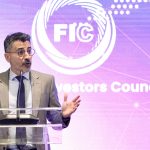Belgrade, June 10, 2025 – In a world increasingly shaped by economic and geopolitical turbulence, the Third Financial Services Conference: INVESTMENTS IN FOCUS – GLOBAL TRENDS, LOCAL RESPONSES, organized by the Foreign Investors Council (FIC) in Serbia in cooperation with the European Bank for Reconstruction and Development (EBRD), brought critical issues of economic resilience and adaptation to the forefront. Rising inflationary pressures, market fragmentation, growing protectionism, and complex international sanctions regimes are increasingly affecting the flow of capital, goods, and services, as well as business expectations and investment decisions in Serbia. In light of these challenges, it is essential to intensify dialogue between the public and private sectors to ensure long-term economic stability and sustainable growth.
The Conference was opened in the presence of numerous dignitaries, with introductory speeches by members of the FIC’s Board of Directors, Mr. Zoran Petrović, President of the Executive Board of Raiffeisen Bank of Serbia, and Mr. Matteo Colangeli, Director of the EBRD for the Western Balkans, and the Governor of the National Bank of Serbia, Ms. Jorgovanka Tabaković.
In his opening address, FIC BoD member and president of the Executive Board of Raiffeisen Bank of Serbia, Mr. Zoran Petrović, noted that the biggest risks for countries and companies today come from the sphere of geopolitics. “When it comes to Serbia’s economic parameters, a slowdown was recorded in 2025 due to lower investments and reduced consumption, which was primarily due to turbulent geopolitical events. Tensions in the country may further adversely affect the further development of investments and consumption. International financial institutions have revised downward GDP growth estimates for Serbia for this year and next. It is expected that the Serbian economy could achieve growth of around 3 percent this year, and that the average inflation rate will be slightly below 4 percent. It is a good thing that in these challenging times, Serbia has high FX reserves with good fiscal indicators” Zoran Petrović stated, recalling that the Foreign Investors Council’s White Book contains 451 recommendations for improving the business climate; significant progress in implementation was achieved (to a significant or certain extent) in 20 percent of them. “The greatest advancements have been made in energy and digitalization. In order to attract new, both foreign and domestic investments, we believe that more intensive efforts in negotiations with the European Union on obtaining membership status, as well as strengthening the rule of law and the fight against corruption, are essential,” stated Zoran Petrovic.
Matteo Colangeli, FIC BoD member and EBRD Director for the Western Balkans addressed the audience and emphasized that in increasingly uncertain times, it is important for Serbia to invest in the competitiveness of its economy and its resilience to external shocks. “Maintaining the stability of the financial system, strengthening infrastructure, developing human capital with a focus on innovation, diversifying energy sources towards renewables and using them more efficiently, and improving the governance of state-owned enterprises should be among the key priorities. EBRD is committed to support Serbia in all those areas, as we continue to step up our investments in the country which already exceed 10 billion euro to date” – concluded Colangeli.
The Governor of the National Bank of Serbia (NBS), Ms. Jorgovanka Tabaković, emphasized in her opening address:
“When it comes to the National Bank of Serbia, investors—as well as all actors within the country’s economic system—can count on our full support in maintaining a stable macroeconomic environment. Today, I will once again underline that stability and predictability in business are fundamental to the continued growth and development of any economy and society, including our own. That is why we must safeguard stability in a challenging and highly competitive global environment, marked by unprecedentedly rapid changes in all areas of life and work. Without stability, even the most carefully designed investment policies cannot deliver sustainable results.”
Panel participants shared their insights and perspectives, including Matteo Colangeli, FIC BoD Member and EBRD Regional Director for the Western Balkans, Darko Stamenković, General Manager of the Banking Supervision Department, National Bank of Serbia, Siniša Daničić, FIC BoD Member and Director at Atlantic Grand, Danilo Mrvaljević, Co-President of the FIC Financial Services Committee and Head of Treasury and ALM at Banca Intesa, Andrijana Jovanović, State Secretary, Ministry of Economy of the Republic of Serbia. The panel was moderated by Dušan Lalić (Generali Osiguranje), Co-President of the FIC Financial Services Committee.
Over the years, FIC members have made a significant contribution to the development of the financial services sector in Serbia by initiating numerous innovations and improvements to existing solutions—many of which have already been implemented, while others are expected to be adopted in the near future. These include: the introduction of qualified electronic signatures in the cloud, real-time electronic transaction recording and online fiscalization, e-invoicing, the launch of Serbia’s first registered electronic identification scheme, and enabling fast and simple payments of monthly bills, in-store and online purchases through the national IPS (Instant Payment System) using QR codes, among others. These initiatives have been recognized and supported by the relevant institutions—particularly the National Bank of Serbia—which has taken important steps toward enhancing the competitiveness of the Serbian economy.
_________________________________________________________________________
The FIC consists of about 120 members who have invested about 45 billion euros and employ directly more than 116,000 citizens of Serbia. About 75% of the FIC member companies are companies from the EU. Corporate culture, highly ethical operations, and modern principles of corporate management of member companies make the FIC a reliable partner not only for the Government of the Republic of Serbia but also for domestic companies. Despite numerous challenges over time, the FIC’s key pillars have remained unchanged: independence, transparency, expertise, best international practices, and, above all, support for more intensive European integration.




































































































